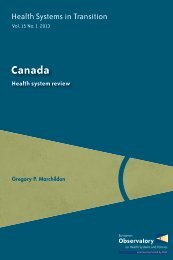Health Systems in Transition - Hungary - World Health Organization ...
Health Systems in Transition - Hungary - World Health Organization ...
Health Systems in Transition - Hungary - World Health Organization ...
You also want an ePaper? Increase the reach of your titles
YUMPU automatically turns print PDFs into web optimized ePapers that Google loves.
<strong>Health</strong> systems <strong>in</strong> transition <strong>Hungary</strong> 159<br />
for people with disabilities) <strong>in</strong> the primary social care category, while daytime<br />
social care was shifted from the special social care category to primary social<br />
care.<br />
Accord<strong>in</strong>g to the new classification, primary social care <strong>in</strong>cludes four<br />
community care services, daytime social care <strong>in</strong> <strong>in</strong>stitutions and five basic<br />
services: (1) village and homestead caretaker service ensures access to basic<br />
public services and meets the most important personal and community needs<br />
<strong>in</strong> villages with less than 600 <strong>in</strong>habitants (village caretaker) or less than 400<br />
with at least 70 people liv<strong>in</strong>g <strong>in</strong> the outskirts (homestead caretaker); (2) social<br />
cater<strong>in</strong>g provides at least one hot meal per day for social service beneficiaries;<br />
(3) domestic help assists people <strong>in</strong> need <strong>in</strong> daily housekeep<strong>in</strong>g and personal<br />
adm<strong>in</strong>istration activities; (4) alarm-system-based domestic help, <strong>in</strong>troduced<br />
<strong>in</strong> 2003, works as a stand-alone service or as a complementary service to<br />
domestic help; and (5) family assistance service helps to deal with crisis<br />
situations <strong>in</strong> families (particularly concern<strong>in</strong>g social issues or mental illness).<br />
Accord<strong>in</strong>g to Act III of 1993 (1993/1), every settlement is obliged to provide<br />
social cater<strong>in</strong>g and domestic assistance, while family assistance is compulsory<br />
only <strong>in</strong> settlements with more than 2000 <strong>in</strong>habitants. The target group of the<br />
alarm-system-based domestic help <strong>in</strong>cludes elderly people, people with severe<br />
disabilities or psychiatric patients liv<strong>in</strong>g alone or <strong>in</strong> two-person households<br />
(Article 63).<br />
In 2007 the number of persons utiliz<strong>in</strong>g the family assistance service was<br />
455 per 10 000 <strong>in</strong>habitants, and there were 692 village and 242 homestead<br />
caretaker services <strong>in</strong> operation. There were 101.4 recipients of social cater<strong>in</strong>g<br />
per 10 000 <strong>in</strong>habitants, with 464.4 recipients per 10 000 <strong>in</strong> the population<br />
over 60 years of age. Only 75% of municipalities provided the service, with<br />
smaller villages typically be<strong>in</strong>g the exception (Mester, 2010). Domestic help<br />
was utilized by 45.8 recipients per 10 000 population, or 209.6 persons per<br />
10 000 population aged over 60 years. Here, regional <strong>in</strong>equalities <strong>in</strong> access to<br />
care have been aggravated further by a decrease (of 1606 between 2002 and<br />
2007) <strong>in</strong> the number of workers. Consequently, the number of care recipients<br />
<strong>in</strong>creased from 5.5 per nurse to 7.3 per nurse (Mester, 2010).<br />
Domestic assistance is of special relevance for specialist home care: it is<br />
meant to serve as the <strong>in</strong>terface between social care and health care, s<strong>in</strong>ce social<br />
nurses are expected to realize when their clients are <strong>in</strong> need of health care<br />
services and to notify home care services accord<strong>in</strong>gly (1993/1, Article 63).
















